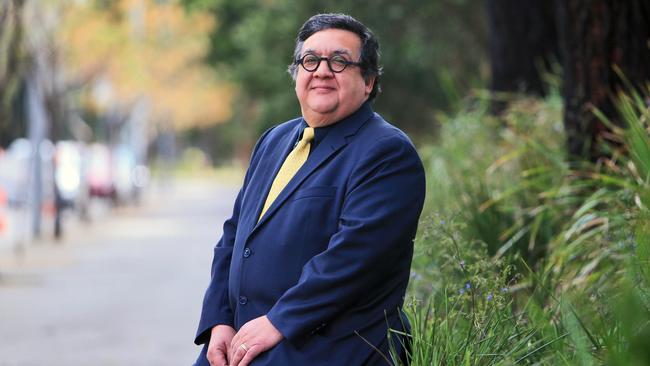Cryptocurrency too big for super funds to ignore: Hostplus
Cryptocurrency as an investment has become too big to ignore, with it only a matter of time before the digital assets are held by the nation’s superannuation funds.

Cryptocurrency as an investment has become too big to ignore, with it only a matter of time before the digital assets are held by the nation’s superannuation funds.
That is the view of Hostplus chief investment officer Sam Sicilia, who says it is no longer possible to dismiss the booming crypto market simply because of regulatory headwinds.
“Hostplus does not have crypto investments, but I do see the day where it becomes mainstream for institutional super funds,” Mr Sicilia said.
“It’s not just about a return for us. We need a governance structure, we need safekeeping of the assets and there are regulatory requirements.”
Super funds needed to do a lot of work before they are “crypto-ready”, and the headwinds, such as regulatory challenges, had to be fixed before there could be any move, he said.
Mr Sicilia’s comments come after Bank of America last month put out a research paper on crypto with the same sentiment and as institutional investors around the globe mull crypto’s investment prospects.
“With a $US2 trillion-plus market value and more than 200 million users, the digital asset universe is too large to ignore,” BoA crypto and digital assets strategy analysts Alkesh Shah and Andrew Moss wrote, as they predicted crypto-based digital assets could form an entirely new asset class.
“Bitcoin is important with a market value of $US900bn, but the digital asset ecosystem is so much more: tokens that act like operating systems, decentralised applications without middlemen, stablecoins pegged to fiat currencies, central bank digital currencies to replace national currencies, and non-fungible tokens enabling connections between creators and fans.
“It’s difficult to overstate how transformative blockchain technology, digital assets and the thousands of decentralised apps that have yet to be created could potentially be.”
The Reserve Bank this month cautioned on the “fervour” and “speculative demand” for crypto, warning of the potential for a severe price decline.
Cryptocurrencies had “no intrinsic value, typically do not have any issuer standing behind them, and rely on users’ trust in the software protocol that controls the system”, the RBA’s head of payments policy Tony Richards said on Thursday.
“There are plausible scenarios where a range of factors could come together to significantly challenge the current fervour for cryptocurrencies, so that the speculative demand could begin to reverse, and much of the price increases of recent years could be unwound.”

If global policy action to deal with particular concerns about the use of cryptocurrencies was taken, along with the arrival of new stablecoins and central bank digital currencies, then existing cryptocurrencies might, at best, have only niche use cases, he warned.
Mr Sicilia, who oversees Hostplus’s $75bn in assets under management, still believes stocks will deliver the best returns for retail investors for the foreseeable future, even as he predicted volatility in bitcoin would open up buying opportunities well below its current $US60,000 price tag.
“I think we can get 10 per cent or more out of equity markets each year until people have a choice to put their money somewhere else. And that could be a long time from now,” he told The Australian.
“People will keep putting their money into equity markets to get dividends. That’s the driving force powering markets. And there will be volatility, of course, but so be it. Where else are they going to put their money?”
Institutional investors had more choice, with infrastructure, property and other unlisted assets all providing attractive returns, he said.
Hostplus has been pumping money into venture capital and is now one of Australia’s largest institutional investors with over $2.2bn committed to the sector, of which $1.5bn has been invested.
The fund last week announced a $6.8m investment in South Australian satellite start-up Fleet Space.
The investment represented a strategic opportunity for the fund to add to its private equity portfolio while supporting an emerging business, Mr Sicilia said.
Among its other venture capital investments are two plays on fusion energy.
“The flagship one is Commonwealth Fusion Systems, a company that spun out of MIT in Boston. We have $320m invested in what is, in essence, a start-up,” he said.
CFS is trying to produce fusion energy by creating, in essence, a magnetic bottle, a high temperature superconductor to generate a much stronger magnetic field, Mr Sicilia explained.
“If they’re successful, we should have net fusion for the first time somewhere between 2025 and 2030.”
Another of its fusion plays is UK-based First Light Fusion, which is hoping to get the same end result as CFS but by using high-intensity lasers to fuse hydrogen atoms.
“So we’re pretty happy with the venture capital portfolio that we’ve built. We’ve got quite a few unicorns and quite a few investments that fall in the column of fusion space,” Mr Sicilia said.








To join the conversation, please log in. Don't have an account? Register
Join the conversation, you are commenting as Logout